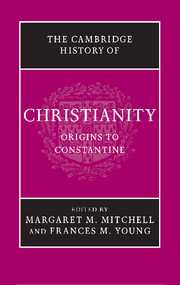Book contents
- Frontmatter
- Prelude: Jesus Christ, foundation of Christianity
- Part I The Political, Social and Religious Setting
- Part II The Jesus Movements
- 4 Jewish Christianity
- 5 Gentile Christianity
- 6 Johannine Christianity
- 7 Social and ecclesial life of the earliest Christians
- Part III Community Traditions and Self-Definition
- Part IV Regional Varieties of Christianity in the First Three Centuries
- Part V The Shaping of Christian Theology
- Part VI ‘Aliens’ become Citizens: towards Imperial Patronage
- Conclusion: retrospect and prospect
- Bibliographies
- Index
- Map 1. The Roman Empire in the time of Marcus Aurelius
- References
5 - Gentile Christianity
from Part II - The Jesus Movements
Published online by Cambridge University Press: 28 March 2008
- Frontmatter
- Prelude: Jesus Christ, foundation of Christianity
- Part I The Political, Social and Religious Setting
- Part II The Jesus Movements
- 4 Jewish Christianity
- 5 Gentile Christianity
- 6 Johannine Christianity
- 7 Social and ecclesial life of the earliest Christians
- Part III Community Traditions and Self-Definition
- Part IV Regional Varieties of Christianity in the First Three Centuries
- Part V The Shaping of Christian Theology
- Part VI ‘Aliens’ become Citizens: towards Imperial Patronage
- Conclusion: retrospect and prospect
- Bibliographies
- Index
- Map 1. The Roman Empire in the time of Marcus Aurelius
- References
Summary
Definitions and designations
In the years after his death, the adherents of Jesus of Nazareth – a Galilean, Aramaic-speaking Jew – multiplied, but there was as yet no word ‘Christianity’. The telltale term in our sources refers not to the believers, but to their defining message: to euangelion, ‘the good news’. In a letter written to ‘the assemblies of Galatia’, a figure of unmatched importance for what was to become ‘Gentile Christianity’ – a Jew named Paul – recounted a meeting in Jerusalem in the 40s between himself and other Christ-believing preachers to discuss the nature and provenance of their respective efforts. Paul reports that Peter and James and John (the ‘so-called pillars’ of the Jerusalem church), on the one hand, and himself and Barnabas and Titus, on the other, executed a formal agreement, sealed by handshake, that called for two distinct but equally divinely mandated and empowered missions. In calling them ‘the gospel of the uncircumcision’ and ‘the gospel of the circumcision’ (Gal 2:7–8), these early Christian missionaries appear to be plotting the new term euangelion, ‘good news’, onto a fixed dichotomy between Jews and Gentiles. But it was not so simple.
There were different sociological maps at work in the world of the first century, but all present themselves as an absolute polarity of ‘us’ versus ‘them’. The Jewish world-view – which was the template for all early Christians – uses such biblical distinctions as ‘Jews’ versus ‘the nations’ (ta ethnē = ‘Gentiles’), and ‘circumcised’ versus ‘uncircumcised’.
Keywords
- Type
- Chapter
- Information
- The Cambridge History of Christianity , pp. 103 - 124Publisher: Cambridge University PressPrint publication year: 2006



